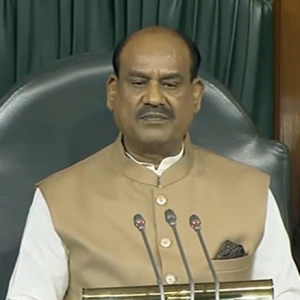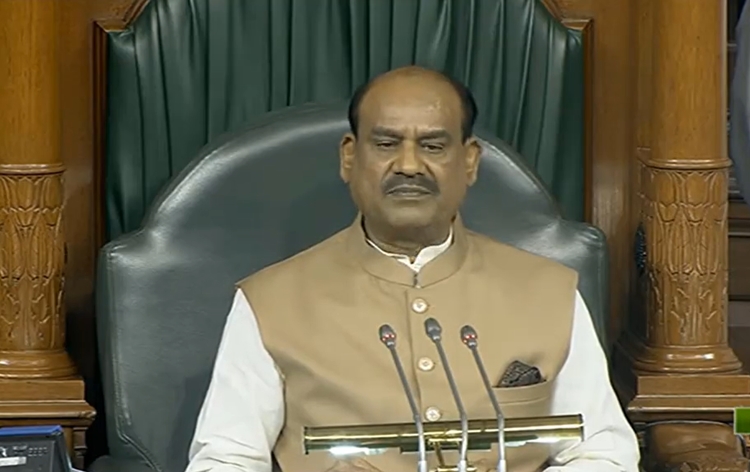
.png) John Dayal
John Dayal

The newly engaged Ambani scion Anant sat with his parents Mukesh and Nita in Row One of the Rashtrapati Bhawan Forecourt as family friend Mr Narendrabhai Damodardas Modi took oath for the third time as Prime Minister of India.
The Second Family of Corporate India applauded, and it was joined by the heads of governments of five South Asian nations, excluding Pakistan, and the crème de la crème of politics, commerce, films, sports, the fine and performing arts, sadhus by the score, and a bishop or two.
The Chief of the Army Staff and the Chief of Defence Services sat in the third or fourth row. The rest of the some 7,000 invited guests were mostly members of the Bhartiya Janata Party from nearby states and the leaders of Mrs Modi's alliance partners, Telugu Desam's Andhra chief minister-designate Nara Chandrababu Naidu and Bihar chief minister Nitish Kumar.
The entire opposition was represented by Congress president Mr Mallikarjuna Kharge, in his capacity as the leader of the Congress Party in the Lok Sabha. The rest of the opposition boycotted Mr Modi's swearing-in, which he has termed historic as it equals the record of India's first prime minister and iconic freedom fighter, Jawaharlal Nehru.
Mr Modi must particularly have felt the absence of Mr Nehru's descendants, Mrs Sonia Gandhi, the chairperson of the INDIA pre-election coalition, and her son and presumptive leader of the opposition, Rahul Gandhi, the first to be so designated after ten years.
The opposition boycott was rooted in several issues. Mr Modi's noxious campaign, in which he spewed as much hate against the Nehru-Gandhis as he did against the Muslims of the country, was a powerful reason.
But perhaps even more powerful was the anger against the Election Commission of India. It failed to respond to the protests of candidates and parties that thousands of electronic voting machines, EVMs, in the 543 constituencies showed more votes counted than the documents showed as actually cast. The mismatch could mean victory or defeat in scores of sears. And that could translate into a possible actual defeat for Mr Modi and a victory for INDIA. In effect, perhaps the Opposition coalition had been robbed of an election sweep, routing Mr Modi, and a shot at forming the government.
The Prime Minister, nattily dressed for the occasion as usual, had, however, been diminished considerably in not being able to muster a simple majority in the election and having to depend on two partners with whom he has had uneasy relations.
In election speeches, he once pilloried Mr Naidu as a man who could not be trusted because he had betrayed his father-in-law, the actor and Andhra chief minister N T Rama Rao. In turn, Mr Naidu had said he thought Mr Modi was the worst politician he had ever known in India.
That memory took away much from the mood, so to say, of Mr Modi's followers, though the back benches kept up chants and hoots of welcome as first he, and then his cabinet, took the oath.
There was no surprise, mystery, or enthusiasm as almost all of Modi 2.0's ministers, who won their seats or were in the Rajya Sabha, took oath once again.
Two ministers from TDP, Kinjarapu Ram Mohan Naidu, would later be given Union Civil Aviation ministry. Dr Chandra Sekhar Pemmasani was named minister of state for Communications and Rural Development. Former Karnataka chief minister H D Kumaraswamy, an uncle of the Hasan former MP and alleged serial rapist Revanna, was taken in as minister for heavy industries and steel. Ram Nath Thakur is the new minister of state for the Ministry of Agriculture and Farmers Welfare.
These are not very exciting ministers in the popular eye, and these were not exactly the most exciting picks for central jobs. Kinjarapu Ram Mohan Naidu may, perhaps in the future, make it to the first page as the youngest minister this season and the richest man in parliament with a known wealth of over 5,000 crore rupees.
No doubt, therefore, that the chatter in the gathering was about the missing Smriti Irani, who lost to what she thought was a non-entity. She was disappointed because, before the elections, her boast was to defeat Mr Rahul Gandhi, as she had done in 2019. Mrs Irani's days are over in Delhi ministerial politics, and not just because she lost.
Another person, the Sikh leader Raneet Bittu, once a Congressman, lost as the BJP candidate from Bhatinda in Punjab but was yet sworn in, as the BJP is making string overtures to Sikhs who they have annoyed in the recent past during the farmers' agitation. The older Sikh minister and once diplomat, Mr Hardeep Puri, remains in the government.
In a not very subtle way, by retaining almost all of his earlier cabinet and most of them in the ministries they held, he is asserting that nothing has changed for him despite the loss of such a large number of seats in the general elections and the sharp decline in the votes he himself got in his Varanasi seat. It is a vain boast.
Barring Mr Gadkari's Ministry of Road Transport, in which he has excelled by all accounts and where he has more or less taken the decisions, the other ministers have hardly had any work other than to okay and sign papers that come from the Prime Minister's Office, the PMO.
The PMO remains intact, as does the National Security Adviser, Mr Ajit Doval, who is given a full cabinet minister's rank and is therefore no less than Mr Rajnath Singh, the Defence Minister, Mr Amit Shah, the Home Minister, and Mr S Jaishankar, the Minister for External Affairs.
Not that they will protest; they know they are also diminished to that extent. In all these ministries, Mr Modi makes all the major decisions and has the final say in the less important ones. His only real advisers are the PMO, aided by the intelligence agencies.
That also means that for good or for bad, there will be no change at all in major defence, foreign affairs, internal affairs and economic policies. Whether it is called stability or stagnation remains to be seen. In all such ministries, even the ones held by the JDU and the TDP, there will be very little freedom of action in real terms, and both Mr Nitish Kumar and Mr Nadu know it. Anyway, they will be busy with state politics shortly. Nitish is preparing for the assembly elections, and Naidu hopes to stabilise his party and build the new capital at Amravati before his term ends.
For the allies, the known devils are better than the new unknowns. They know that there are dissidents, among them Rajnath and Gadkari. They know the stooges, the ministers for finance and external affairs, to name two.
The real arena of the Modi-opposition confrontation will be the floor of the Lok Sabha, beginning right away with the choice he makes of Speaker. The name is the prerogative of the ruling party, and the opposition traditionally gets a go at the post of the Deputy Speaker. The Official Leader of the Opposition, in the rank and pay of a Cabinet minister, also then plays an important and constitutional role and is an automatic member of various statutory committees, including those for choosing members and chair of other constitutional bodies.
Mr Om Birla, the Speaker of the 16th Lok Sabha, would arguably be described as the worst India has seen since it was first constituted. His rule reduced parliament to a rubber stamp, with literally often no one from the opposition in the chamber. In addition, Mr Modi and Mr Birla decided not to elect a deputy speaker, and the duo totally controlled the Lok Sabha.
The media consistently highlighted the significant confrontations between Mr Modi and the Congress, the TDP, and the DMK throughout the five years of the Lok Sabha.
To begin with, Parliament House itself was demoted without any real discussion, and a new one was built cheek-by-jowl with the old one. The central vista was altered. Rashtrapati Bhawan escaped renaming and structural changes, but the Vice President was moved to a new complex behind the Parliament Complex. Of course, the prime minister's residence will also shift to the high-security complex nearby. It is said this is for security reasons and to reduce inconvenience to the public in VVIP movement on the roads.
In fact, 49 MPs were suspended in the debate on parliament security after the breach on December 13, in which young men and women disrupted the Lok Sabha proceedings in the new chambers.
This action of the Speaker came after 78 opposition were suspended from the remainder of the crucial Winter Session.
In total, 141 lawmakers—95 from the Lok Sabha and 46 from the Rajya Sabha—were suspended. The opposition has dubbed the government's move a "mockery of democracy." Important legislation was passed without any debate, and parliamentary democracy was undermined as never before.
Congress leader Mr Jairam Ramesh called it "a complete purge, executed so that draconian Bills are passed without any meaningful debate, and so that the BJP MP who facilitated the entry of the two intruders into the Lok Sabha on December 13 goes scot-free." Equally galling was the case of the popular TMC member and financial wizard, Ms Mahua Moitra, from West Bengal. She was expelled over an allegation of misconduct for taking expensive handbags and shoes from a male friend. The BJP wanted to dub it Cash for Questions, but there was no proof of a money trail.
Ms Mahua deemed her expulsion politically motivated and moved the Supreme Court against her removal. The entire process was cut short, and due process was given a go-by.
Mr Rahul Gandhi's Lok Sabha membership was cancelled after a local court in Gujarat, Mr Modi's home state, convicted him in a defamation case. The seat was restored to Mr Gandhi after the Supreme Court overturned his conviction. It was clear to the court and to the public that a trumped-up case and a pliable judge were used to see if Mr Gandhi could be banned from contesting the general election due then.
"The proportion of Bills referred to Committees has decreased from 71% during the 15th Lok Sabha to 16% during the 17th Lok Sabha," the non-profit Legislative Research group, PRS, said. No Bill was referred to House Committees. About half of the Bills passed by the 17th Lok Sabha were cleared after less than two hours of discussion each, and only 16% were referred to standing committees, PRS said. Till the last Winter Session, 172 bills were discussed and passed during the term of the 17th Lok Sabha. Of these, 86 (48%) were passed by the Lok Sabha and 103 (60%) by the Rajya Sabha. The Lok Sabha passed 34 (20%) Bills with two to three hours of discussion each, 28 (16%) with three to four hours of debate each, and 24 (14%) with more than four hours of discussion each.
That sums up Mr Modi's vision of Parliamentary democracy. The opposition hopes to challenge that and change it when the first session begins later in June.